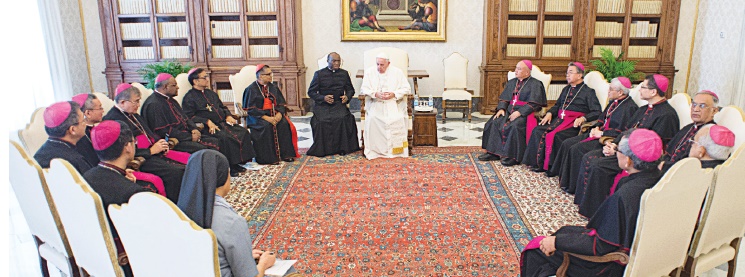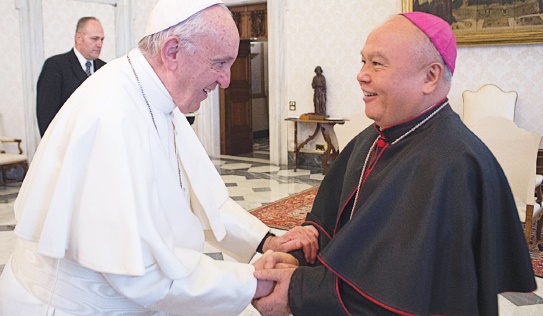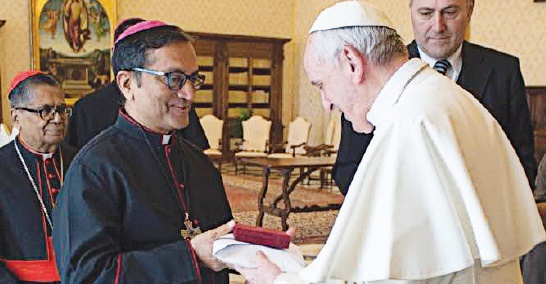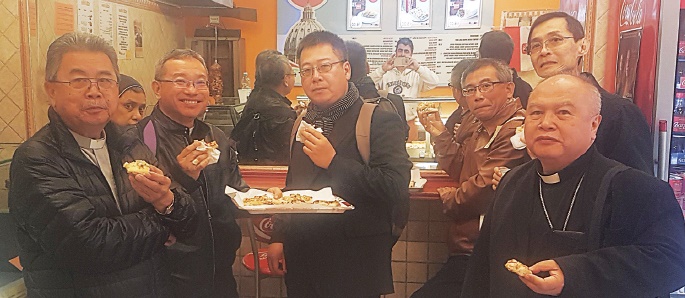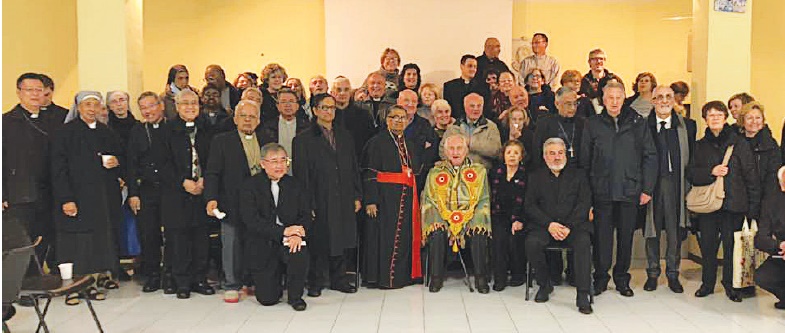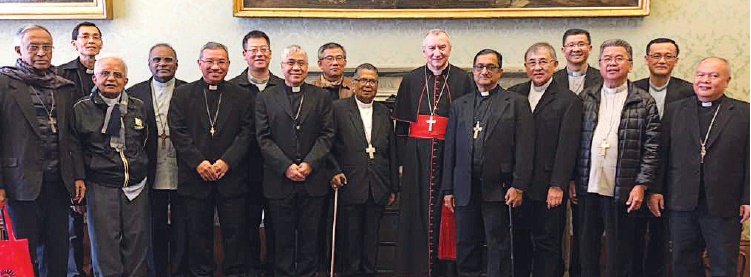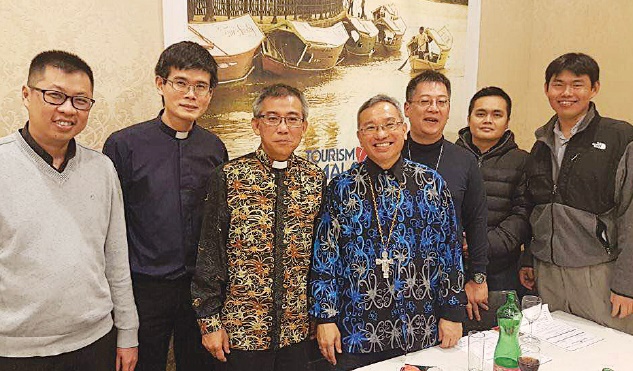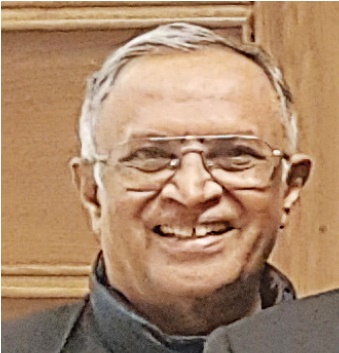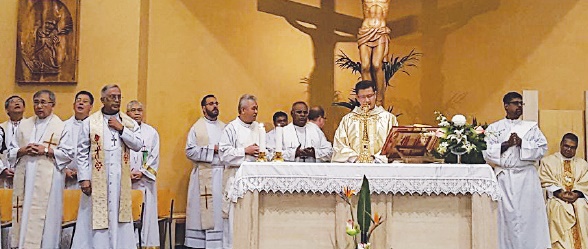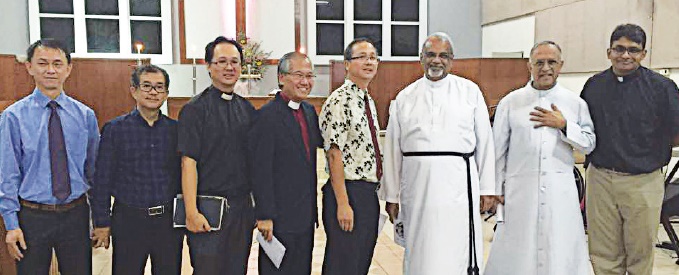Crux: Is this your first Ad Limina visit with Pope Francis?
Bishop Sebatian Francis: For me, it’s the first, yes. He has changed the culture a little bit, so there’s more listening. That doesn’t mean he doesn’t say what he has to say, but whatever he says is after listening to us. The word “listening,” the word “discernment,” are quite profound in his replies. It’s not just the usual rhetoric. When he makes a point, about several issues, he doesn’t use too many words and it is quite clear!
What sort of issues came up?
We met the various dicasteries during the day (Vatican departments) and by the end of the day, we seemed to have discussed quite a bit of concerns on liturgical matters, seminary formation and many others including our political situation especially with Cardinal Pietro Parolin, Secretary of State and Archbishop Paul Gallagher, Secretary for Relations with States.
By the time we reached the Pope, we had said it all. The conversations with him were more on the direction of the Church itself vis-s-vis the world. Also, it’s about the kind of direction and momentum the Church needs to have within itself in order to be a credible witness in the world. In our conversations with Pope Francis, we were able to sense the direction the Pope was taking.
We wanted to show our appreciation for the direction he is giving the Church, and also discussed some little difficult issues here and there … one of them was Amoris Laetitia. We had a very open discussion and the orientation was very clear.
How did the discussion go on Amoris Laetitia?
To begin with, we can’t just talk about one particular chapter, — chapter eight — which was a bit of a brouhaha for some people. [The reference to the chapter of Amoris is titled “Accompanying, discerning and integrating weakness,” which, among other points, referred to Catholics who have divorced and remarried outside the Church.] The point is, he said you must be fair and look at the whole picture, and not just zero in on some particular issues.
I think he was right in saying that you’ve to get the spirit of the document as a whole, and not just a problematic thing that relates to rituals, sacraments, or things like that.
What did you tell the Pope in general about the direction of the Church?
Many of us affirmed to Pope Francis that we’re happy with the direction he’s taking for the Universal Church and we feel that we are in solidarity with him. Our churches are feeling encouraged by it, because we have taken the same direction as he has, I think.
Did you want to do that because you know there are some who aren’t encouraged by Pope Francis?
Yes, but it’s more than that. It’s a genuine conviction that this is what the Holy Spirit is saying to the Church today.
You mentioned things at a national level [in Malaysia], for instance a recent court decision that both parents’ consent is necessary for the religious conversion of a child to be valid. Did you discuss this, and what’s your take?
I think the decision was a good decision. It seems to go along with the Federal Constitution, which is a secular constitution and it’s supposed to be the paramount constitution of the country. We cannot be running a country with two constitutions side-by-side — Civil and Syariah.
I also think that Indira Gandhi was very courageous. Considering the situation in Malaysia, she showed a great amount of wisdom and courage. She said something I thought was very encouraging for all of us, Muslims and non-Muslims.
Right now, by law, she has the right to see the daughter, and the daughter has to listen to her. But she said she’ll listen to the daughter, and if the daughter wishes to continue to be a Muslim and to practise the Islamic religion, she’ll encourage it. That’s tremendous, com-ing from her.
I think she is a good Hindu woman and a very wise mother. She showed much courage and wisdom.
She takes no advantage of the court’s decision but tries to work out what is best for her daughter.
The word “Allah” and its usage in Malaysia
Crux: Has the ruling had any repercussions in the Christian community?
We actually work very closely with the leadership of all the major religions. We meet very often, and an issue like this has been discussed not only in the Hindu community but among a wide range of religious leadership that includes Hindus, Buddhists, Christians, Sikhs and Taoists. We are very strong … it’s a nationally registered body, so when we speak, we don’t speak just as Christians, we speak as one. Of course, the Muslims are not there, for reasons known only to them, but we speak with one voice and we take a stand together.
In this case, it’s not just a Hindu issue. It’s equally also our concern and our issue.
Are you looking forward to the March 22 decision on the use of ‘Allah’ in Christian Bibles?
The case on the usage of the word “Allah” was taken to the Supreme Court, which we call the ‘Federal Court,’ in Malaysia. The case was settled with the ecision of the non-usage of the word “Allah” is only for one publication, HERALD, the Catholic Weekly [a publication of three dioceses in Peninsular Malaysia]. It does not apply to any other situation of the usage of that word, in worship, in catechetics, in formation, in community life …
Is it in your Bible right now in the Malaysian language?
Yes, it’s in the Bible.
Do you use it in Sunday Mass?
Yes, but internally. We don’t use it outside of our churches. It’s a kind of discretion, but none of us have stopped using the word. I think they [Muslims] understand that too.
The new cases you’re talking about aren’t directly linked to this. They’re new cases coming, interestingly enough, from East Malaysia, Sabah and Sarawak. There was a particular ruling of the court that, in some ways, does not apply [to other situations]. The cases come from Evangelical churches.
Do you agree that there is much religious expression in Malaysia?
At least externally, it looks like that. There are many temples, many, you name it … Buddhists, Taoists, Hindus, Sikhs, as well as churches. We can build churches — there’s a bit of a struggle to get the permits and permissions, but it goes through, at some point, with a little bit of patience and endurance.
To speak for Peninsular Malaysia, we have the sense that we’re a very inclusive Church. We pray not just for ourselves and our own rights and privileges, but for all. That comes up quite evidently in our daily prayer, and in how we relate to God and God’s people.
Do you feel the Muslim community is also inclusive?
I think they’re struggling with that. There are pockets who reach out to us, and we reach out to them. Of course, for them politics and religion are all intertwined and interrelated, so it’s kind of a scale about how you feel about it. On national issues, we have to relate to them and they have to relate with us. We meet each other from time to time. I don’t feel isolated from them, or them from me.
Article reproduced from Herald Malaysia online

 Pin Cross 0125
Pin Cross 0125 
